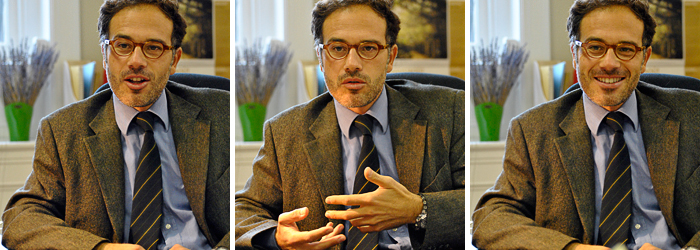
Giorgio Resta is a professor of comparative private law whose physical movements mirror his subject of study: in the past five years, he has taught in the United States, Argentina, Canada, Germany, France as well as his native Italy, at the University of Bari, where he is based. Comparative law, to Resta, is an endeavour that necessitates understanding of the context in which the law operates and this understanding arises best from direct immersion into a country and its legal system. He explained this philosophy to inFocus reporter Victoria Leenders-Cheng.
Q: How did you become interested in comparative law?
A: I was attending the PhD program in Private Law at the University in Pisa and my mentor, Guido Alpa, encouraged me to study abroad as soon as possible. I had the chance to spend some time at Yale attending courses like Calabresi’s Torts, Ackerman’s Justice, Damaska’s Comparative Law and Hansmann’s Economic Analysis of Law. The cultural shock was so big and I was so enthusiastic about an intellectual approach so different from the positivistic and formal perspective yet prevailing in Europe that I discovered an immediate passion for diversity and therefore for comparative law.
Q: What is your primary area of focus?
A: I look at the relationship between freedom of contract and personality and how the law has historically been coping with this issue in different legal systems in Germany, France, Italy and the United States.
Contrary to the general comparative approach that posits a distinction or opposition between common law and civil law, I work a lot on the distinction between European social, political and legal models and American models. In many parts of the law, American law is less similar to England, for example, than England is to Europe. With the Europeanization of the law and with the particular ideas of the welfare state, if you look not just at the black letter rules but also at the political, social, and economic context, you will have different results in the taxonomies of comparative law.
Q: The curriculum at the Faculty of Law emphasizes a bijuridical approach to studying the law and it seems that you want to challenge this focus on common law versus civil law.
A: I have a more pluralistic idea of the civil law traditions: I focus a lot on German law because I know that after the first trend of the expansion of French law, it is German law that is now taking the lead, for example, in East Asia. German law is really important in the recodification of law in China and in Japan, as it has been, for example, in Greece, after the war. For many countries, the conceptual German approach is so important that you have to take it into account if you want to do transsystemic work, if you want to compare civil, which is not only French, law.
However, I think transsystemia is a fascinating approach. I’ve been using the transsystemic method in the eight years I’ve been teaching in Bari and I believe that an educational curriculum that compares legal systems is absolutely important in Europe, even more so than having a common civil code. Before you can harmonize the law, you have to harmonize legal minds, or you have to give students the possibility to understand others.
Q: One way to better understand others is to do what you’ve done – live, study and teach at universities all over the Europe and North America. What are some of the insights you’ve picked up along the way?

A: I’ve always been struck by different cultural perspectives. For instance, in Germany, the Professor might decide that the lecture starts c.t. (cum tempore) or s.t. (sine tempore). Cum tempore, or “with time,” means the lecture starts 15 minutes after the official start; sine tempore, or “without time,” means the lecture start time is without the added 15 minutes. I always considered that a sign of the German passion for organization and predictability. In Italy nothing is written, but everybody assumes that the lecture starts 15 minutes after!
Another anecdote: when I was in the United States, I was so impressed at seeing students eating and drinking during the class… and when I attended some Faculty Lunch Workshops here at McGill, I understood that the cultural assumptions towards food and lecturing might be very different on either side of the ocean!
And the last and very pleasant ‘shock’ was at seeing Dean Jutras serving beer to students and faculty members during Coffee House: that would never happen in my country (and I guess Europe in general) and that’s why I am so glad to be here!
..
Q: You wrote a paper in 2008 about the tension between mass media and fair trial rights, examining how this conflict plays out in the US as well as in countries in Europe. What was your argument?
A: This started because I was invited to a conference by Duke Law School regarding the Duke Lacrosse Case [in which three Duke students and lacrosse team members were falsely accused of rape and two of them were arrested and indicted on charges of first degree forcible rape]. The players were acquitted but not before their names were broadcast and many people offered their opinions about them.
What we have here is this terrible mishap where these individuals lost their reputation and have had problems finding jobs, but they can’t sue the media because of the First Amendment and the reading of the First Amendment by the Supreme Court in the last 50 years. The situation in England or in Canada is totally different from that in the United States because we don’t have this sacralization of the First Amendment under the general ideological structure of freedom of the press.
My argument was that the debate of administration of justice and mass media has focused on this dichotomy between a fair trial and freedom of the press. What is lacking in this dichotomy culturally is the issue of personality protection. You’re just scared of the effects of prejudicial reports on the outcome of the trial but you really don’t consider privacy, lack of control of personal identity, reputation effects of a trial, even if you are acquitted. In Europe, we have a totally different system of administration of justice, so a prejudicial report by the media does not pose too many problems in terms of the outcome, and we approach this issue more from the perspective of protecting personal privacy.
I was interested in understanding how different cultures and how the different relationship between the citizen and the state may influence private litigation and therefore the administration of justice; mass media was a very good case study to understand the different constitutional models and public law models of personality.
Professor Resta will be giving a conference on Personality v. Privacy: Law and the Construction of Personal Identity at McGill’s Faculty of Law on November 24, 2010.
Photo credits: Lysanne Larose; Victoria Leenders-Cheng
